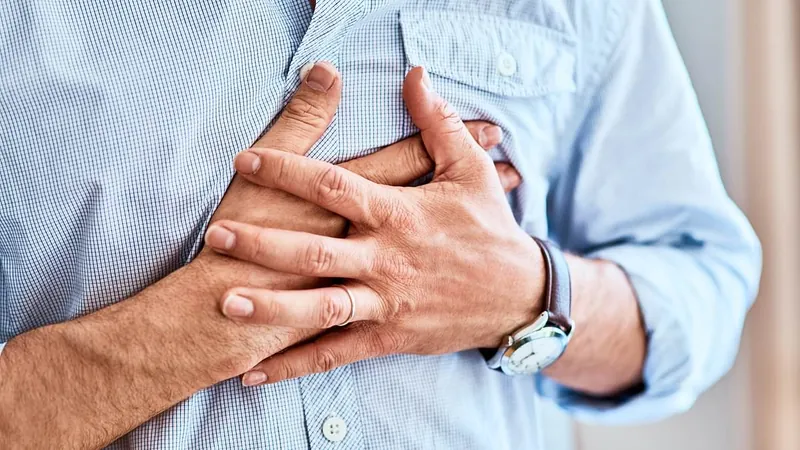
Heart Attack Warning Signs for Young & Fit: What You Need to Know Now!
2024-10-04
Heart Attack Warning Signs for Young & Fit: What You Need to Know Now!
In an alarming health revelation, doctors are urging young and seemingly fit individuals to stay vigilant about the subtle signs that may precede a heart attack. A study has shown a startling increase in heart attack occurrences among Americans aged 18-44, rising by a staggering two-thirds over just four years. Surprisingly, many of these victims have maintained what appears to be a healthy lifestyle.
Heart attacks can strike without warning, but common symptoms often include sudden chest pain, discomfort, or a sensation of tightness. However, experts emphasize that manifestations may begin days, weeks, or even hours before a heart attack strikes, sometimes being misinterpreted as less critical ailments.
Dr. Deepak Bhatt, a cardiologist at Mount Sinai in New York, has highlighted that excessive sweating upon waking should not be brushed off — this could indicate heart trouble ahead. The data from 2019 indicated that about 0.3% of people in this age group experienced a heart attack, which surged to 0.5% the following year, meaning one in every two hundred individuals faced this crisis. Although the percentage seems minor, it represents a 66% increase, alarmingly leading to one in five heart attack patients now being under 40 years old.
Factors contributing to this trend include increased obesity rates, rampant drug use, sedentary behavior, and poor dietary choices. Dr. Virginia Colliver from Johns Hopkins has voiced her concern over rising heart disease risk factors among young people, typically linked to high blood pressure, elevated cholesterol levels, and smoking habits.
Interestingly, hormonal contraception methods, such as birth control pills, have also come under scrutiny since they can elevate blood pressure and increase clot formation risk, especially in younger women. Dr. Colliver notes, "If you have a history of high blood pressure or clotting issues, alternative contraceptive methods might be advisable."
One lesser-known precursor to heart attacks is experiencing sudden shortness of breath, even without physical exertion, which can occur days or even a week prior. Research shows that about half of individuals who later suffer a heart attack exhibit symptoms well in advance. Chest discomfort or pain often masquerades as musculoskeletal issues or mild exertion fatigue, leading to underestimation of the severity.
Compounding the issue, young women are reportedly less likely to present with typical chest pain during a heart attack, delaying vital treatment. A 2012 study revealed that 42% of young women did not report chest pain when experiencing a heart attack. Moreover, discomfort in the jaw or neck could signal an impending heart attack, which Dr. Bhatt stresses should not be dismissed, as this type of referred pain can mislead patients and medical practitioners alike.
Among the young adults experiencing these early signs is 24-year-old Raquel Hutt from New York, who reported intolerable pain in her left arm before her heart attack. Other symptoms that could indicate an impending heart attack include nausea, dizziness, excessive fatigue, and even digestive issues.
Annually, approximately 805,000 Americans experience a heart attack, with around 375,000 resulting in death. While older adults, specifically those over 65, are the most affected demographic, this new trend among younger individuals underscores the pressing need for awareness and early intervention.
Heart attacks commonly occur when small blood clots obstruct arteries, cutting off vital oxygen and nutrients to the heart. Treatment is crucial and timely; patients may receive blood-thinning medications, along with pain relief drugs such as morphine. In more severe cases, surgical procedures may be necessary to restore blood flow.
With the rise of heart attacks among young and fit individuals, educating the public about these warning signs could prove lifesaving. Don't wait until it's too late — be aware and take action if you notice any concerning symptoms!



 Brasil (PT)
Brasil (PT)
 Canada (EN)
Canada (EN)
 Chile (ES)
Chile (ES)
 España (ES)
España (ES)
 France (FR)
France (FR)
 Hong Kong (EN)
Hong Kong (EN)
 Italia (IT)
Italia (IT)
 日本 (JA)
日本 (JA)
 Magyarország (HU)
Magyarország (HU)
 Norge (NO)
Norge (NO)
 Polska (PL)
Polska (PL)
 Schweiz (DE)
Schweiz (DE)
 Singapore (EN)
Singapore (EN)
 Sverige (SV)
Sverige (SV)
 Suomi (FI)
Suomi (FI)
 Türkiye (TR)
Türkiye (TR)